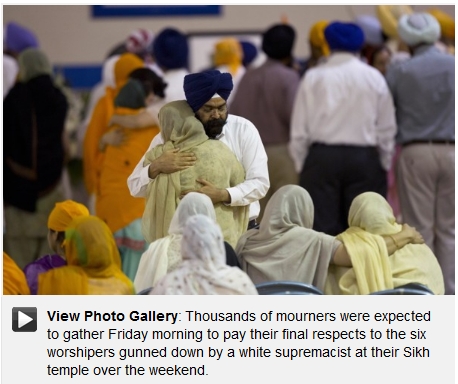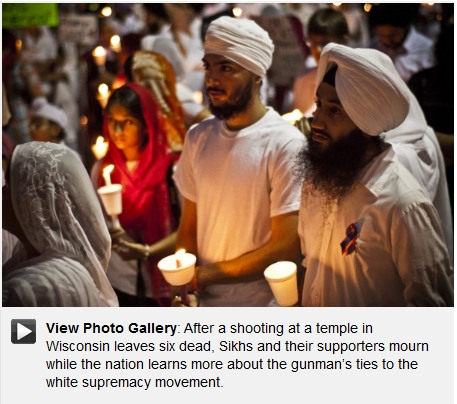
For Sikh Americans, Oak Creek has become both a cause for introspection and an urgent call to action. The shooting is the greatest single tragedy to happen to Sikhs in America, but it’s also unique among American tragedies; it may be the largest racially-motivated massacre in recent U.S. history. A month later, Americans across the political spectrum should pause from election season politics in a moment of introspection.
Last Sunday, I went to my own neighborhood gurdwara (Sikh house of worship) in Connecticut to reflect and pray. In the hall, there was a large homage to Lt. Brian Murphy, the police officer who took bullets when stopping the gunman in Oak Creek. The diwan (prayer service) was dedicated to providing solace in the aftermath of Oak Creek. I closed my eyes and listened to voices singing in prayer:
Jo Jo Deeno, So Nanak Leeno.
Whatever God gives, we receive with grace.
As an advocate, I have never found great comfort in thinking about tragic events as the Will of God. It too easily becomes a way for people escape responsibility for the conditions that make tragedy happen. After all, the mother and fathers massacred in Wisconsin died at the hands of a man cultured in the ways of hate. But in the shabad (prayer), I began to hear the deeper meaning in receiving God’s Will.
What have we received from God in Oak Creek? Certainly, death and pain and grief. The magnitude of this loss would cause most people to display anger or a desire for revenge. But when national leaders came to Oak Creek to mourn with the victims, they stood in awe of the Sikh community’s response. They witnessed acceptance rather than anger.
Immersed in prayer in the days after the mass shooting, Sikhs in Oak Creek received the pain as a gift from God. One does not turn away a gift, or bury it, or rage against it but receive it with an open heart. We wept over this gift together; we let it in entirely. “I have no hate for the gunman,” said Santokh Singh, still healing from the two bullets wounds he took to his stomach. He looked me in the eye and said, “What happened was done by God.”
Grief was not the only gift we received in Oak Creek. The national attention Sikhs received in the wake of Oak Creek was unprecedented in more than 100 years of Sikh American history. Although media coverage was short-lived, many Sikhs offered fellow Americans a glimpse of not just who we are but more importantly, how we are.
This tragedy offered an opportunity to embody the spirit of chardi kala – everlasting optimism and high spirits even in the darkest time. Sikh families in Oak Creek showed chardi kala when they transformed their gurdwara from a crime scene into a sacred space just four days after the shooting. Sikhs across the U.S. showed chardi kala when they held hundreds of vigils joined by thousands of people and called for an end to all violence.
Now that the initial aftermath has ended, many Sikhs understand that it will take more than stricter gun control laws to prevent another Oak Creek. It will take renewed commitment to combat hate across the political spectrum. Efforts are already underway in three arenas of public life: government, media, and education.
A coalition of religious and human rights groups are calling for the government to hold congressional hearings on hate crimes in the U.S. and track hate crimes against Sikh Americans. Surprisingly, the FBI does not track the religious identity of Sikhs in hate crimes data. The victims in Oak Creek deserve at least the dignity of being counted as a statistic. If we don’t measure the problem, we won’t be able to marshal the resources to respond effectively. Groundswell, in partnership with the Sikh Coalition and the Sikh American Legal Defense and Education Fund, is hosting a petition for people of many faiths to ask Attorney General Eric Holder to change FBI policy and begin tracking anti-Sikh hate crimes. In the coming months, advocates will call upon the government to lift the ban on turbaned Sikhs in the U.S. military and do more to end racial profiling.
Concerned Americans are also raising their voices through traditional and new media to encourage a national discussion on the lessons of Oak Creek. Through op-eds, blogs, and social media, they are discussing the rise of hate groups in America, brainstorming solutions for preventing violence, and calling upon elected officials to check hateful anti-immigrant and anti-Muslim rhetoric. The Be Proud movement, hatched in response to Oak Creek, invites people to post a one-minute video on YouTube calling for an end to hate.
In the education arena, many colleges and universities will respond to Oak Creek this fall through storytelling and service projects via President Obama’ Interfaith and Community Service Campus Challenge. They will host film screenings about the Sikh American community and dialogues about ways to combat hate and build community. Some campuses will follow up through year-long service projects in collaboration with local Sikh communities. Campuses can find resources online, and the Interfaith Youth Core will host a conference call on Thursday, Sept. 6, 2012, for Sikh students who want to lead interfaith engagement.
Election season politics makes it difficult to pause in a moment of reflection. But in a time when our economic recovery is incomplete, guns are easily accessible, political rhetoric is dangerously divisive, and hate groups are on the rise, we cannot afford to forget Oak Creek. Today, all Americans can join with Sikh Americans in receiving this gift: the opportunity to take bold new steps to build community and prevent another Oak Creek.
Sign the petition asking the FBI to track anti-Sikh hate crimes.
Show your college or university how to respond to Oak Creek through storytelling and service.
Join the organizing conference call for Sikh college students on Thursday.
----------------------------------------
Valarie Kaur , an award-winning filmmaker, legal advocate, and interfaith organizer, is founding director of Groundswell , an initiative at Auburn Seminary that combines storytelling and advocacy to mobilize faith communities in social action. Kaur studied religion and law at Stanford University, Harvard Divinity School, and Yale Law School, where she now directs the Yale Visual Law Project . Her documentary “Divided We Fall” is the first feature film on hate crimes against Sikh Americans after 9/11. You can follow her on Twitter at @valariekaur ..
---------------------------------
Related Article:
http://www.sikhnet.com/news/call-action-sikh-college-students-your-help







